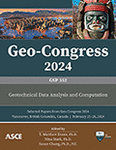Three-Dimensional Granular Flow Simulation Using Graph Neural Network-Based Learned Simulator
Publication: Geo-Congress 2024
ABSTRACT
Reliable evaluations of geotechnical hazards like landslides and debris flow require accurate simulation of granular flow dynamics. Traditional numerical methods can simulate the complex behaviors of such flows that involve solid-like to fluid-like transitions, but they are computationally intractable when simulating large-scale systems. Surrogate models based on statistical or machine learning methods are a viable alternative, but they are typically empirical and rely on a confined set of parameters in evaluating associated risks. Conventional machine learning models require an unreasonably large amount of training data for building generalizable surrogate models due to their permutation-dependent learning. To address these issues, we employ a graph neural network (GNN), a novel deep learning technique to develop a GNN-based simulator (GNS) for granular flows. Graphs represent the state of granular flows and interactions, like the exchange of energy and momentum between grains, and GNN learns the local interaction law. GNS takes the current state of the granular flow and estimates the next state using Euler explicit integration. We train GNS on a limited set of granular flow trajectories and evaluate its performance in a three-dimensional granular column collapse domain. GNS successfully reproduces the overall behaviors of column collapses with various aspect ratios that were not encountered during training. The computation speed of GNS outperforms high-fidelity numerical simulators by 300 times.
Get full access to this article
View all available purchase options and get full access to this chapter.
REFERENCES
Battaglia, P. W., Hamrick, J. B., Bapst, V., Sanchez-Gonzalez, A., Zambaldi, V., Malinowski, M., Tacchetti, A., Raposo, D., Santoro, A., and Faulkner, R. (2018). “Relational Inductive Biases, Deep Learning, and Graph Networks.”.
Battaglia, P. W., Pascanu, R., Lai, M., Jimenez Rezende, D., and Kavukcuoglu, K. “Interaction Networks for Learning About Objects, Relations and Physics.” Proc., NIPS.
Choi, Y., and Kumar, K. (2023). “Graph Neural Network-Based Surrogate Model for Granular Flows.”.
Durante, M. G., and Rathje, E. M. (2021). “An Exploration of the Use of Machine Learning to Predict Lateral Spreading.” Earthquake Spectra, 37(4), 2288–2314.
Gao, L., Zhang, L. M., Chen, H. X., Fei, K., and Hong, Y. (2021). “Topography and Geology Effects on Travel Distances of Natural Terrain Landslides: Evidence from a Large Multi-Temporal Landslide Inventory in Hong Kong.” Eng Geol, 292.
Ju, L.-Y., Xiao, T., He, J., Wang, H.-J., and Zhang, L.-M. (2022). “Predicting Landslide Runout Paths Using Terrain Matching-Targeted Machine Learning.” Eng Geol, 311.
Kumar, K., Salmond, J., Kularathna, S., Wilkes, C., Tjung, E., Biscontin, G., and Soga, K. (2019). “Scalable and Modular Material Point Method for Large-Scale Simulations.”.
Kumar, K., Soga, K., Delenne, J.-Y., and Radjai, F. (2017). “Modelling Transient Dynamics of Granular Slopes: Mpm and Dem.” Procedia Engineering, 175, 94–101.
Kumar, K., and Vantassel, J. (2022). Graph Network Simulator: V1.0.1 (Version V1.0.1).
Lube, G., Huppert, H. E., Sparks, R. S. J., and Freundt, A. (2005). “Collapses of Two-Dimensional Granular Columns.” Physical Review E, 72(4).
Mast, C. M., Arduino, P., Mackenzie-Helnwein, P., and Miller, G. R. (2014). “Simulating Granular Column Collapse Using the Material Point Method.” Acta Geotechnica, 10(1), 101–116.
Sanchez-Gonzalez, A., Godwin, J., Pfaff, T., Ying, R., Leskovec, J., and Battaglia, P. “Learning to Simulate Complex Physics with Graph Networks.” Proc., International conference on machine learning, PMLR, 8459–8468.
Soga, K., Alonso, E., Yerro, A., Kumar, K., and Bandara, S. (2016). “Trends in Large-Deformation Analysis of Landslide Mass Movements with Particular Emphasis on the Material Point Method.” Géotechnique, 66(3), 248–273.
Utili, S., Zhao, T., and Houlsby, G. T. (2015). “3d Dem Investigation of Granular Column Collapse: Evaluation of Debris Motion and Its Destructive Power.” Eng Geol, 186, 3–16.
Yerro, A., Soga, K., and Bray, J. (2019). “Runout Evaluation of Oso Landslide with the Material Point Method.” Canadian Geotechnical Journal, 56(9), 1304–1317.
Zeng, P., Sun, X. P., Xu, Q., Li, T. B., and Zhang, T. L. (2021). “3d Probabilistic Landslide Run-out Hazard Evaluation for Quantitative Risk Assessment Purposes.” Eng Geol, 293.
Zenit, R. (2005). “Computer Simulations of the Collapse of a Granular Column.” Physics of Fluids, 17(3), 031703.
Information & Authors
Information
Published In
History
Published online: Feb 22, 2024
ASCE Technical Topics:
- Artificial intelligence and machine learning
- Computer models
- Computer programming
- Computing in civil engineering
- Engineering fundamentals
- Engineering materials (by type)
- Flow (fluid dynamics)
- Flow simulation
- Fluid dynamics
- Fluid mechanics
- Geohazards
- Geotechnical engineering
- Granular materials
- Hydrologic engineering
- Materials engineering
- Models (by type)
- Numerical models
- Three-dimensional flow
- Three-dimensional models
- Water and water resources
Authors
Metrics & Citations
Metrics
Citations
Download citation
If you have the appropriate software installed, you can download article citation data to the citation manager of your choice. Simply select your manager software from the list below and click Download.
